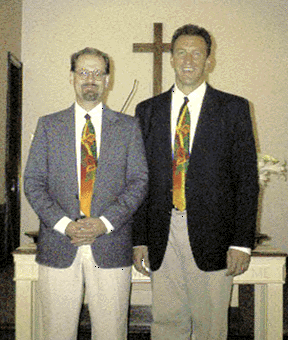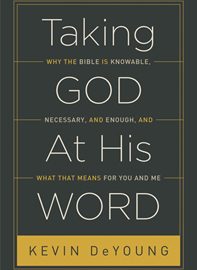The Scriptures are materially sufficient. This simply means the content of divine revelation God intends His people to have is contained entirely in Scripture. That is, all the doctrines Christians are to believe are found in the Bible. The Bible alone is a sufficient source for the believer. The Scriptures are God-breathed (2 Tim. 3:16), and the very voice of God (Rom. 9:17; Gal.3:8). Christians have an infallible standard by which to judge the words of men (Acts 17:11). The Bible is a lamp to our feet and a light to our path (Ps. 119:105). It was the standard the Lord Jesus used to evaluate extra-biblical tradition (Mt. 15:3-6). All things are subject to it, nothing stands by its side as its equal. There is no tradition or infallible church that shares its unique place in the life of the believer.
Some Catholics advocate a particular form of this view. Along with affirming totum in Scriptura, Catholics who maintain a type of material sufficiency also hold Tradition likewise contains the entire content of revelation: totum in traditione. This Tradition is seen as an active process of handing down truth, and that truth is a living heritage, or content. Thus, for some Roman Catholics, two vehicles carry God’s special revelation in total: Scripture and Tradition. Both are infallible.
To my understanding, this is not the official view of the Roman Catholic Church. Rather, it is one acceptable view within their sect. The other would be the view that part of God’s special revelation is contained in the Scripture, and part is contained in Tradition. This would be the partim-partim view. In this view, the Bible is materially insufficient. The New Catholic Encyclopedia states of those who hold this view, “Neither tradition nor Scripture contains the whole apostolic tradition. Scripture is materially (i.e., in content) insufficient, requiring oral tradition as a complement to be true to the whole divine revelation” [Source: New Catholic Encyclopedia (1967) Vol 14, p.228].
While still a Cardinal, Joseph Ratzinger (now the Pope) stated, “…no one is seriously able to maintain that there is a proof in Scripture for every catholic doctrine” [See Joseph Ratzinger’s “The Transmission of Divine Revelation” in Herbert Vorgrimler, ed., Commentary on the Documents of Vatican II (New York: Herder and Herder, 1969), Vol. 3, p. 195]. Ratzinger made this comment with the documents of Vatican II (article nine of Dei verbum) in mind.
Recently, a Roman Catholic stated on my blog that a Protestant using this quote as it is cited above is citing it out of context. He posited Ratzinger clearly embraced “totem in sacra scriptura- totem in traditione.” He didn’t provide any relevant information to explain Ratzinger’s view of “totem in sacra scriptura,” but he did attempt to explain what Ratzinger meant in the above citation, stating that “…he [Ratzinger] was dealing with interpretation (formal sufficiency) and not simply material sufficiency.” Earlier though in the same document, Ratzinger states the problem of the material completeness of Scripture was under dispute in 1965, and that “finally the idea of any tradition of this kind was rejected.” This would indeed harmonize with Ratzinger’s statement, “…no one is seriously able to maintain that there is a proof in Scripture for every catholic doctrine.” Both these sentences reside in the same context.
But perhaps the confusion demonstrated by this Roman Catholic is due to the ambiguity of Ratzinger’s words. Ratzinger goes on to point out that even Protestants really don’t believe in material sufficiency. Quoting H. Ott, Ratzinger states an ecumenical protestant should realize “… it is surely also true for a Protestant who has not forgotten the basis of the Reformation that we do not acquire certainty about God’s revelation only from Holy Scripture, but also through preaching and the inner testimony of the Holy Spirit.” In other words, Material sufficiency is false even for Protestants, because God uses means outside of Scripture with his people.
But this is a false understanding of what Protestants mean by material sufficiency. “Acquiring certainty” is not extra-Biblical revelation. 1 John 5:13 states, “These things have I written unto you, that ye may know that ye have eternal life, even unto you that believe on the name of the Son of God.” Similarly John 20:31 states, “But these are written that you may believe that Jesus is the Christ, the Son of God, and that by believing you may have life in his name.” The certainty I have is due to the fact that no authority can stand above God’s word to validate God’s word. God says in the Scriptures “I can know,” and therefore, I can know! Further, by implication, Ratzinger holds that the Roman Church provides certainty, but this indeed is an unproven assertion. There is no decree from God stating that the Roman Church is infallible and provides absolute certainty. It is simply assumed by adherents of Roman Catholicism.
Ratzinger also attempts to use preaching as a denial of material sufficiency. But what is preaching? It is the oral proclamation of God’s Word. What content preached will savingly penetrate the heart? Only the Word of God, not cute anecdotes, jokes, or stories. The Word of God is that which is sharper than any double edged sword, judging the thoughts and attitudes of the heart (Heb. 4:12), whether spoken or written. Ministers are to preach the Word in season and out of season, to correct, rebuke and encourage. The content of their preaching, if they wish to be true men of God, is the content given in sacred Scripture.
Ratzinger then uses the “inner testimony of the Holy Spirit” to disprove material sufficiency. But one only believes in the “inner testimony of the Holy Spirit” because the Bible affirms and teaches it. Romans 8:16 states, “The Spirit himself testifies with our spirit that we are God’s children.” How do I know with certainty that I savingly believe God’s word? Because God’s word states my certainty is due to God’s Spirit confirming the Gospel in my heart. It explains and describes what is going on inside me, in the same way the Bible explains and confirms how non-believers are spiritually dead in sin.
The real problem as I see it, is that Ratzinger speaks in ambiguous language. At times he appears to affirm material sufficiency, and then other times, he clearly denies it. It’s no wonder Catholics are often confused on exactly where and to what extent God’s revelation is located. Further, the giant elephants in the Catholic room are such things like the Assumption or papal infallibility. Things like this can’t be found in Scripture, nor can they be traced via Tradition back to the early church. Thus, whatever form of material sufficiency men like Ratzinger or Congar attempt to embrace, they will never be able to be consistent to an exclusive source of revelation without radical redefinition of terms. In some way, partim-partim will have to be redefined to mean “totem in sacra scriptura- totem in traditione.”
Thus, on one of them most vital aspects of authority, Catholics are not united as to the understanding of the relationship between Scripture and Tradition. One would think the hierarchy of the Roman Church would at least provide a clear and definitive statement by which Catholic theologians could agree, particularly since the Roman Church claims infallibility and the ability to interpret God’s Word. That this isn’t the case is obvious to any who try to navigate through Catholic discussions on the relationship between Scripture and Tradition. Perhaps a Catholic could claim the Church has spoken clearly, but because of the fallibility of men, they simply can’t understand the explanations. This of course makes one wonder why the infallible interpreter causes the wisest of the Roman sect to disagree with each other, while the Scriptures give light and understanding to the simple (Ps. 119:130). Jesus and the Apostles never debated on the relationship of infallible Tradition and infallible Scripture, nor does a believer have to today. A believer can simply rest in God’s promise that His Word will make one wise for salvation through faith in Christ Jesus (2 Tim. 3:15), and will thoroughly equip for every good work (2 Tim. 3:17).
Alpha and Omega Ministries is a Christian apologetics organization based in Phoenix, Arizona. James White, director, is a professor, having taught Greek, Systematic Theology, and various topics in the field of apologetics for numerous schools.




